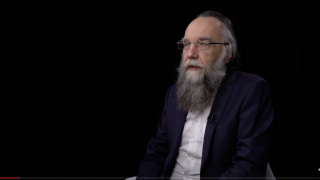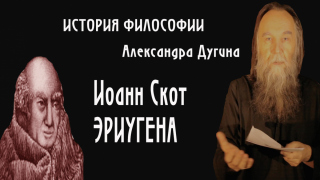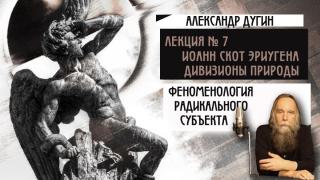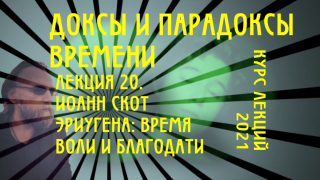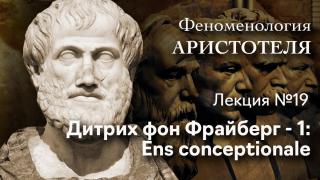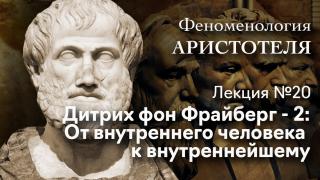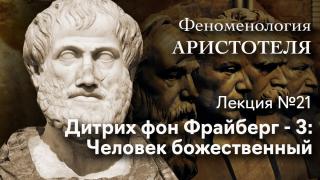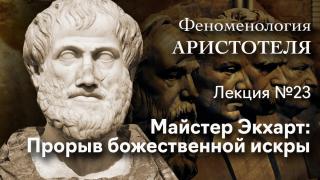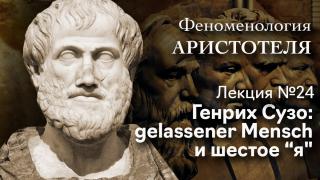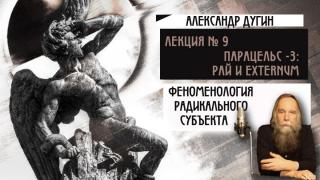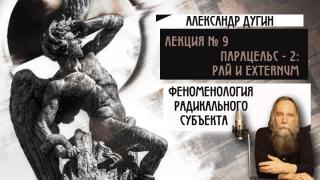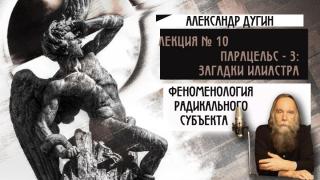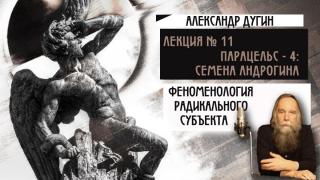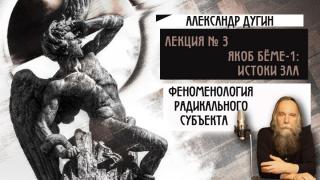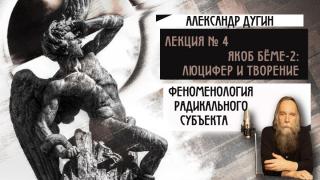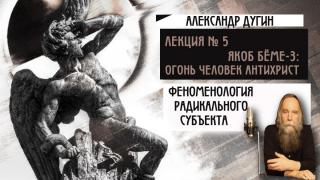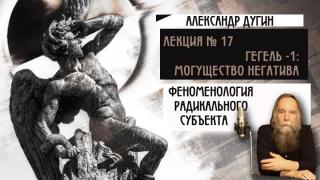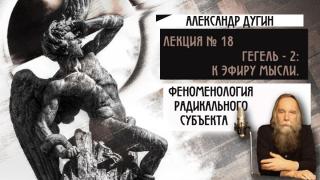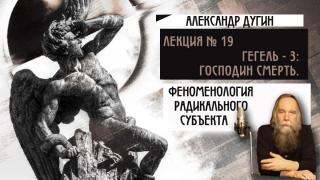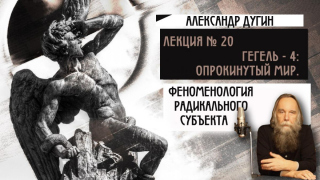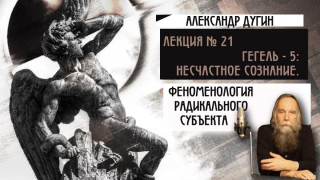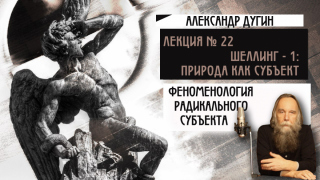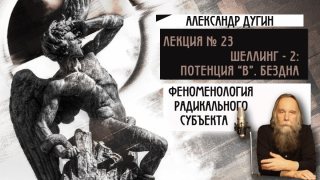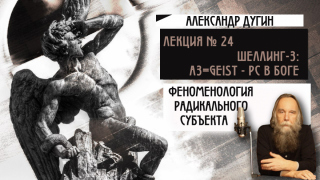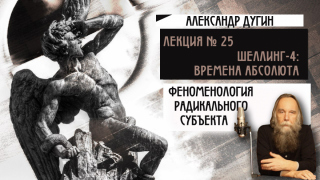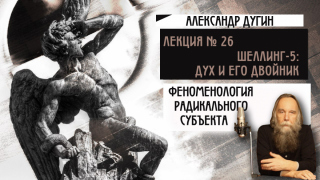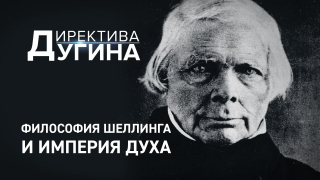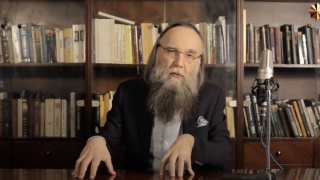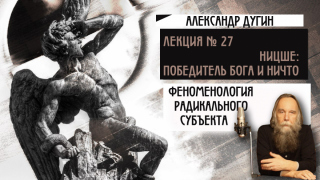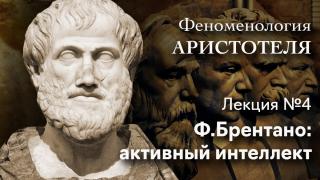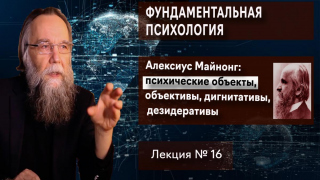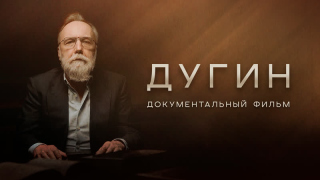- Главная
- История Философии Александра Дугина
История Философии Александра Дугина
Слушать аудио
Смотреть видео
-
10 глупых вопросов ФИЛОСОФУ
Новый герой «10 глупых вопросов» — философ, социолог и общественный деятель — Александр #Дугин. Мы задали Александру Гельевичу глупые вопросы о знании всего, о мышлении и получили на них умные ответы.
0:44 Философ — это человек, у которого есть вопрос на любой ответ?
10:36 Филология круче философии?
16:44 Люблю поразмышлять «о всяком» в свободное от работы время, я философ?
23:16 Читал ли Гоголь Гегеля?
32:43 Обязательно мыслить, чтобы существовать?
35:11 Чего не знают философы?
40:19 Что появилось раньше религия или философия?
57:37 Можно ли порезаться «бритвой Оккама»?
1:04:53 Если философ выпьет, он станет супер философом?
1:08:19 Назовите ответ на вопрос жизни, вселенной и вообще.
-
Иоанн Скот Эриугена (История Философии Александра Дугина)
-
Феноменология Радикального Субъекта. Лекция 7. Иоанн Скот Эриугена: дивизионы Природы
Geschaffene Natur / ewige Natur. Жизнь. Карл Лысый. Эриугена (ок. 810—877).
Natura. Περί φύσεων μερίσμου. Peri physeon. De divisione naturae или Periphyseon μερίσμου.
Тотальность Всего. Граница Creator (increatum) / creatum. donum / datum.
Четыре деления divisio / specie Naturae.
Бог - предшествующий бытию creans et non creatum (negatio omnium) nihil per excellentiam
Идеи – София creans et creatum πρωτότυπα /προορίσματα/ ἰδέαι/ θεΐα θελήματαАнгел / Человек как Imago
Вещи – creatum et non creans
Ничто – non creatum et non creans
reditus. nihil per privationem ?
Движение Бога
God moves from Himself in Himself towards Himself.
Движение
- Motion is a natural power hastening towards its end
- Motion is a passion coming from one to another, ot which the end is impassibility
- Motion is an active operation, of which the end is self-perfectionЭкзистенция но не субстанция Бога
Бог знает, что Он есть , не знает Чтó Он есть
God knows [of Himself] what He is, does He not define Himself— for everything which is understood by itself or by another as to what it is can be defined.
Григорий Назианзин
So God does not know of Himself what He is because He is not a “what”, being in everything incomprehensible both to Himself and to every intellect.
Человек знает, что он есть, но не знает чтό он есть.
- Триада Сущность – Сила – Действие
οὐσία δύμανις ἐνέργεια
οὐσία λόγος θελήμα
София
Постоянное в тварном движении
in all things whatever is rightly understood to be is nothing else but the manifold power of the creative Wisdom which subsists in all things.
if in your mind you take away the creative Wisdom from all things which it creates they will be reduced to nothing
В Мудрости Божией все вещи и вечные и созданы
Ангелы
Созерцание нетварных логосов
the Cause of all things is inaccessible to all things that are created by it, then there
can be no doubt but that the reasons of all things, which exist [in it] eternally and without change, are completely inaccessible to all things of which they are the reasons.
Ангелы как эпифании
In the intellects of the angels there are certain theophanies of those reasons, that is to say, certain [divine] manifestations which are comprehensible to the intellectual nature, but which are not the reasons, i.e. the primary exemplars.
Ангелы смотрят над собой, в себя и под собой.
Ангелы как движение
The celestial essences, which the Divine Oracles also call the celestial and angelic powers, are substantially nothing else but intelligible, eternal
[and] unceasing motions about the Beginning of all things for they understand that they are from Him and that their intellect moves through Him and in Him, and they know for certain that they have no other end than Him],
Апофатический человек
Imago
Григорий Нисский
Человек не познаваем как Imago
Об устроении человека
Ум как единство всех типов восприятия
Кто разумѣ умъ Господень? говоритъ Аностолъ (Рим. 11, 34.). А я присовокуплю къ этому : кто уразумѣ ообственный свой умъ?
Такъ какъ однимъ изъ свойствъ, усматриваемыѵь въ Божіемъ естествѣ, есть неностижимость сущности: то по всей необходимости и образъ въ этомъ имѣетъ сходство съ Первообразомъ. Если бы естество образа оказалось постижимымъ, а первообразъ былъ выше постиженія; то сія противоположность усматриваемыхъ свойствъ обличила бы погрѣшительность образа. Но какъ не подлежитъ познанію естество нашего ума, созданнаго но образу Сотворшаго: то имѣетъ онъ точное сходство съ превыше-Сущимъ , непознаваемостию своею отличая непостижимое свое естество.
Бог знает, что Он есть, но не знает Чтό Он есть.
Связь visio beatifica и Мельхисидека
Мельхисидек вне времени (нет отца и матери)
Visio beatifica погружение в созерцание предтварных логосов
Отсюда опыт видения всего мира в целом: из-за пределом пространства и времени только и можно увидеть пространство и врмея
Движение человека
Душа есть движение
For the essential being of the soul is not other than her substantial motion. For the soul subsists in her motions and her motions subsist in her. For she is by nature simple and indivisible, and is differentiated only by the substantial differences of her motions.
Первое движение души
the motion of the soul which (…) illumined by knowledge, perfected by the divine word, by which she eternally revolves about the unknown God is called voùç by the Greeks but by our writers intellectus or animus or mens.
it exists substantially, and is understood to be the principal part of the soul.
Второе движение души
The second motion of the soul, as we have said, is that which is contained within the bounds of its nature and defines the Very God as Cause, that is, it knows only this about the God Who is unknown as to what He is, (namely), that He is the Cause of all things that are, and that the primordial causes of all (things) are eternally created by Him and in Him .
Под душой φαντασίαι
Над душой θεοφάνειαι / divinae aparitiones
Это движение души есть λόγος или δύναμις или ratio virtus
Разум пред-знает и пред-создает вещи
Разум форма интеллекта
Третье движение души
Διάνοια ἐνέργεια operatio
Проекция единства формы как причины в рацио во вне – через фантазии и чувства
Люди
what is to prevent us from understanding in a similar way that human intellects unceasingly revolve about God, seeing that they are from Him and through Him and in Him and for Him [for they revolve in the same intelligible circle].
В движении человека открывается движение Бога
Тело создано душой
Первое тело было создано чистой душой в раю
Второе тело создано и созидается душой непрерывно и сейчас
But I do not hesitate to say that this corruptible and material body which was taken from the mud of the earth after sin and as a punishment for sin, was created and is daily being created as though by some proper action of the soul.
the soul is the image of God, the body the image of the soul this mortal body attached to the soul after it had sinned, which is called also an image of an image < as we have often said> . For as God created the soul in His image, so the soul makes the body as a kind of instrument somehow similar to herself.
Тело воскресения
That first incorruptible body which would have remained attached to the soul if she had not sinned, where is it now? For what is incorruptible cannot perish.”
To this there is a short answer : Until now it lies hidden in the secret recesses of human nature, but in the age to come it will appear when
this mortal (body) will be changed into it, and “this corruption will put on incorruption”.
то, без чего не
ων ἄνευ
5 модусов Esse Non Esse
Схватываемое интеллектом и чувствами (есть) – не схватываемое интеллектом и чувствами (не есть) nihil per excellentiam
- Иерархический модус – принадлежащие градусу есть, не принадлежащее градусу не есть (affirmatio enim hominis negatio est angeli, negatio vero hominis affirmatio est angeli)
- Потенциальное и актуальное – актуальное из причины есть, потенциальное в причине не есть
- Идеи есть вещи не есть
- Осененные благодатью есть пораженные грехом не есть
есть
не есть
1
воспринимаемое (умом или чувствами) 2 и 3
не воспринимаемое (умом или чувствами) 1 и 4
2
данный градус бытия
высший и низший градус бытия в отношении к данному
3
действительно извлеченное из причины
потенциально находящееся в причине
4
идеи 2
вещи 3
5
осененные благодатью (праведники)
сраженные грехом
(грешники)
Категории
essentia / quidditas
οὐσία / τὸ τί ἦν εἶναι
quantitas
τὸ πόσον
qualitas
τὸ πόιον
ad aliquid
τὸ πρὸς τί
situs
κεῖσθαι
habitus
ἔχειν
locus
ποῦ
tempus
πότε
agere
ποιεῖν
pati
πάσχειν
Категории не применимы к Богу
Движение / покой
κίνησις / στάσις
πᾶν
усия, отношение, время, место, действие, страдание не материальны (не чувственны)
качество/количество/отношение/ габитус (кондиция) конституируют матери
Не разложимость форм
Формы не разложимы на всех трех уровнях
Род, вид, особь
Материя полностью разложима
Форма есть семя воскресения и точка рая
Горький ад
Не Inferno
Α ἡδύς
Отлучение 1225
It was condemned by a council at Sens by Honorius III (1225),
Собор в Сансе
Влияние на братьев свободного духа
Братья Свободного духа
Давид Динантский David of Dinant (c. 1160 – c. 1217) De Tomis, seu Divisionibus Quaternuli
Амальрик из Бена или Амальрик Шартрский Amaury de Bène середина XII века — между 1205 и 1207
Ortlieb of Strasbourg начало 13 века
Бегинки/беггарды
council in 1210. The Council was headed by Peter of Corbeil, the Bishop of Sens, and ordered the body of Amalric of Chartres to be disinterred and burned, David's writings to be burned, and forbade reading Aristotle's works on natural philosophy
-
Доксы и парадоксы времени. Лекция 20. Иоанн Скот Эриугена: четыре момента бытия. Возвращение/Воскрешение
Иоанн Скот Эриугена
О разделениях в природе
Определение природы
Природа есть все что есть и чего нет
Разделения природы
- Non creatur et creat Бог
- Creatur et creat Примордиальные начала
these primordial causes of things are what the Greeks call πρωτότυπα, that is, primordial exemplars, or προορίσματα, that is, predestinations, or predefinitions. They are also called by the same θεῖα θελήματα that is, divine volitions. They are commonly called ἰδέαιalso, that is, species or forms in which
- Creatur et non creat Вещи
- Nec creat nec creatur Бог
Негация предыдущего есть аффирмация последующего аффирмация предыдущего есть негация последующего
And the same rule is found to apply in all the celestial essences until one reaches the highest order of all.
This, however, terminates [in] the highest negation [upward] ; for its negation confirms the existence of no higher creature.
For those things which
- in the processions of natures appear to be divided and partitioned into many are in the primordial causes unified and one,
- and to this unity they will return and in it they will eternally and immutably remain.
For in Him they are not two things but one; in our contemplation, however, since we form one concept of God from consideration of Him as Beginning and another concept when contemplating Him as End, they appear to be as it were two forms, formed from one and thesame simplicity of the Divine Nature as a consequence of the double direction of our contemplation.
these two forms are discerned not in God but in our contemplation!!!
Максим Исповедник
Структуры интеллектуального времени: метафизическая эсхатология
Creatio et Reditus
Творение и возвращение
Бытие esse
Благобытие donum
Бытие природа datum esse videlicet
вечное бытие non datum Donor semper esse
Между ними благобытие donum – Gratia благодать well-being
Enter esse et eternaliter esse mediates quaedam constituitur, quae dicitur bene esse.
Благобытие = продукт свободной воли + божественной Благодати
Voluntas intellectualis
Воскресение относится к благобытию – отчасти это опора на природу отчасти на Бога
Эхо
Благода́ть (др.-евр. חן, др.-греч. χάρις, лат. gratia)
Datum vs Donum
Now between “dationes” and “donationes” the difference is this; “dationes” are and are said to be the distributions by which every nature subsists, while “donationes” are the distributions of grace by which every subsisting nature is adorned.
Therefore
- nature is a “datio”,
- grace is a “donatio”.
For every perfect creature consists of nature and grace.
the universe of the whole creation is eternal in the Word of God.
the divine volitions and the things which God has made are one and the same.
for God nothing is future since He includes within Himself all times and all that is in them.
Человек и ангел: диалектика
Аффирмация человека = негация ангела
Негация человка = аффирмация ангела
For if man is a rational, mortal, risible animal,
then an angel is certainly neither a
rationalanimalnormortalrisible:но далее ангел есть рациональное животное (херувим)
likewise, if an angel is an essential intellectual motion about God and [about] the causes of things,
then man is certainly not an
essential intellectual motionabout God and the causes of things.Но ум (нус, интеллект человека) есть сущностное интеллектуальное движение вокруг Бога и первых причин
У О Миры но нет в 444с у Дронке в латинском тексте!
Ангелы = разумные бессмертные животные
angels as rational immortal animals
Люди = разумные смертные животные
В человеческой природе животное в образе и образ в животном
Двойное творение из земли и из души
Ангелы тоже животные духи но в них только животное в образе, а образа в животном нет
Отсюда святые животные и Херувимы
4 херувима дух+зверь и ОДИН ИХ НИХ Человек – херуб, юноша…
mutual relation and unity which exist between intelligible and rational natures
not only is the angelic nature established in the human but also the human is established in the angelic.
the mutual knowledge by which angel understands man and man angel.
Человек хранение взгляда наверх
триада души
- нус, νοῦς сущность нашей души intellectus agens
- логос λόγος δύναμις intellectus possibilis
- дианойя (внутреннее чувство) intellectus passivus
There are three universal motions of the soul,
- of which the first is of the mind,
- the second of the reason,
- the third of sense.
And the first is simple and surpasses the nature of the soul herself and cannot be interpreted [that is, it cannot have knowledge of that about which it moves] ; “by this motion the soul moves about the unknown God, but, because of His excellence, she has no kind of knowledge of Him from the things that are” as to what He is [that is to say, she cannot find Him in any essence or substance or in anything which can be uttered or understood; for He surpasses everything that is and that is not, and there is no way in which He can be defined as to what he is].
Ум апофатический орган
The second motion is that by which she “defines the unknown” God “as Cause” of all. For she defines God as being Cause of all things; and this motion is within the nature of the soul, “and by it she moves naturally and takes upon herself by the operation of her science all the natural reasons (which are) formative of all things, which subsist as having been eternally made in Him Who is known only as Cause” [for He is known because He is Cause], that is, she expresses (them) in herself through her knowledge of them, and the knowledge itself is begotten by the first motion in the second.
Катафатический ум -- каузальность
The third motion is “composite, (and is that) by which” the soul “comes into contact with that which is outside her as though by certain signs and re-forms within herself the reasons of visible things”. It is called composite not because it is not simple in itself as the first and second are simple, but because its first knowledge of the reasons of sensible things does not come from (the things) themselves.
θεοφάνειαι and by the Latins divinae apparitiones, and through them, through the first causes,
virtus - causes
Феноменология рассудка
For first (the soul) receives the phantasies of the things themselves through the exterior sense, (which is) fivefold because of the number of the corporeal instruments in which and through which it operates, and by gathering them to itself (and) sorting them out it sets them in order; then, getting through them to the reasons of the things of which they are the phantasies, she moulds them [I mean the reasons] and shapes them into conformity with herself.
The three motions of the soul, that is,
- intellect which is also called (her) essence, and
- reason which (is called her) power, and
- sense which (is called her) operation,
Две фантазии
Фантазия поднимающаяся над телами - в чувственном но не чувственна сама
Фантазия формирующаяся в душе -- чувственна сама и принимает первую фантазию = внешнее чувство
ἄισθήσις
αἰσθητήρια – αἰσθήσεως τήρια охрана чувств – их 5
We ourselves are not other than our understandings
Non enim aliud sumus, aliud noster intellectus.
В Конце унификация – андрогинат
the unification of man, that is, of his two sexes, into the original unity of nature in which there was neither male nor female but simply man
because man is better than sex!!!
for male and female are not names of his nature, but of its partition through
disobedience, whereas “man” is the special name of his nature ; —or (that) the inhabited globe and paradise will be brought together into that one earth which is the second species of the sensible creature divided into heaven and earth in such a way that even the earth will
[not only] be without variety of parts but [also] will be recalled into a simplicity of nature so as to be believed to be a spiritual rather than a corporeal nature <such as it would be if man were not in a state of sin> , and (so as to) let us understand the words “not divided in
him”, that is in man [for in man all things are unified] “by the difference of its” [the earth’s, that is] “parts” [in the sense that] as there will be no diversity of parts in man because no (element of) composition will remain in him, so also the earth’s nature will be so united with him as to seem one with him and in him. For he says : “but rather so gathered together that none of its parts suffers annihilation”, that is, separation.
whole man, as he says, will become “weightless spirit” and will not be “held down to the earth
by any weight of the body nor hindered from ascending to the heavens”.
[Now we hold that the end of this sensible world will be nothing else but its return into God and into its primordial causes in which it naturally subsists.]
For although spiritual sexes are understood to exist in the soul — for νοῦς, that is, intellect, is a kind of male in the soul, while αἴσθησις , that is, sense,
is a kind of female.
“Gyrating in a gyre the spirit goes forth and returns into its own place.” For the fiery spirit
because of the exceeding subtlety of its nature traverses all things and is made all things in all things, and returns into itself, since it is the substantial source and origin of all visible things and for that reason is called by the Greeks φοετῶν, that is to say, “The Returning One” (Revertens). For, after traversing all the bodies of the world both visibly and invisibly it returns into itself and calls back into itself all things which receive the beginning of their generation from it.
name of “Nothing” nihilum
I should believe that by that name (“Nothing”) is signified the ineffable and incomprehensible and inaccessible brilliance of the Divine Goodness which is unknown to all intellects whether human or angelic — for it is superessential and supernatural —, which while it
is contemplated in itself neither is nor was nor shall be, for it is understood to be in none of the things that exist because it surpasses all things, but when, by a certain ineffable descent into the things that are, it is beheld by the mind’s eye, it alone is found to be in allthings, and it is and was and shall be.
Therefore so long as it is understood to be incomprehensible by reason of its transcendence it
is not unreasonably called “Nothing”
but when it begins to appear in its theophanies it is said to proceed, as it were, out of nothing into something, and that which is properly thought of as beyond all essence is also properly known in all essence, and therefore every visible and invisible creature can be called a theophany, that is, a divine apparition.
For every order of natures from the highest to the lowest, that is, from the celestial essences to the last bodies of this visible world, the more secretly it is understood, the closer it is seento approach the divine brilliance.
Hence the inaccessible brilliance of the celestial powers is often called by theology darkness.
He is the age of ages, subsisting before the ages
- So when we have a clear perception of the Divine Nature as the Beginning and Cause of all things — for He is ἄναρχος and ἀναίτιος , that is, without beginning and without cause, for before Him there is nothing to stand in relation to Him as beginning or cause, but He Himself creates the nature of all things of which He is the Cause and Beginning — we not inappropriately call that Nature creative and not created ; for it creates and suffers itself to be created by none.
- But when we recognize the same Nature, namely the Divine, to be the End of all things beyond which nothing and in which all things eternally subsist and are universally God, we rightly call it neither created nor creative: not created because it is created by none, nor creative because here it no longer creates, for all things have been converted into their eternal reasons in which they shall and do remain eternally, and cease also to be called by the name of creature.
For God shall be all in all, and every creature shall be overshadowed, that is, converted to God, as the stars when the sun arises. Do you then see how we are able to call one and the same nature, namely the Divine, not created but creative when we consider it as the Beginning, but neither created nor creative when we regard it as the End.
the inconstant flux of formless matter — for it is defined thus : Matter is the mutabilityof mutable things capacious of all forms.
Вода
Объяснение зрения и слуха через огонь и воздух
Зрение=огонь из сердца
For sight is a kind of light which first rises out of the fire in the heart and then ascends to the highest part of the head (namely to that part which is called by the Greeks μῆνιγξ but by the Latins “membranula”, by which the brain is surrounded and protected), having passed through certain channels to the eyebrows and the pupils of the eyes, whence in a very swift rush it leaps forth like the rays of the Sun and reaches with such speed the places and bodies that are near or stand very far off before the eyelids and the brows.
Слух – воздух из легких
Again, hearing is a certain very subtle ringing which first issues forth from the breathing of the lungs and rises upwards to the same part of the head through its own hidden paths and, poured into the spirals of the ears, bursts forth and, mingling with the parts of the air which are close to it or further away, hastens to receive without any delay whatever resounds in it.
the material and external body is like a garment and is not improperly regarded as the outward
expression of the internal and natural body : for it is moved through times and ages, suffering increase and loss of itself, while the interior body remains ever immutably in its proper state.
Тело первого творения – рай
Тело воскресения
For everything which comes into being in the world and is composed of the stuff of the
world must of necessity be dissolved and perish with the world.
It was then necessary for the exterior and material body to be resolved into those elements from which it was put together:
but it was not necessary that it should perish, because it came from God.
The interior body, of course, endures forever and abides without change in those principles according to which it was constituted with and in and through and for the sake of the soul.
material body which is added to it is not so much to be regarded as a true body as a kind of mutable and corruptible garment of the true and natural body.
in God nothing is before and nothing after, because for him there is nothing past, nor future, nor the passage from past to future, for “to Him all things are at once present.”
Этапы Возвращения
The end of this present life, then, is the beginning of the next; and the death of the fleshis the token of the restoration of our nature, and the Return to our pristine integrity.
- The first step in the Return of our human nature is taken when the body suffers dissolution and turns back into the four elements of the sensible world from which it was composed.
- The second is fulfilled at the Resurrection when each shall take his own body out of the common fund of the four elements.
- The third when body is changed into soul.
- The fourth when soul, and in fact the whole human nature, shall revert to its Primordial Causes, which ever and immutably abide in God.
- The fifth when that spirit with its Causes is absorbed into God as air is absorbed in light. For when there is nothing but God alone, God will be all things in all things.
The change of human nature into God is not to be thought of as a perishing of the substance but as a miraculous and ineffable Return into that former condition which it had lost by its transgression.
no creature, whether visible or invisible, can fall into nothing.
two greatest errors to which mankind is prone are, according to Augustine, “to think that there is a place above heaven, or a time before the world.”
secular time came into being with and at the same moment as the world, and cannot be regarded as prior to it.
St. Augustine says of God:
- “He moves Himself without place or time;
- He moves the created spirit through time but not in place ;
- He moves the body through place and time.”
place and time shall perish
Деления
- Всё: Творец и тварь
- Тварь: умная и чувственная
- Тварь чувственная: небо и земля
- Земля: парадиз и ойкумена (человечество)
- Человек: муж и жена
So it is from the unification of the division of man into the two sexes that the Return and unification through all the other divisions will take its start. For in the Resurrection sexual differentiation will be done away, and human nature will be made one, and there will be only man as it would have been if man had not sinned.
Восстановление единства:
- мужа и жены в мужа в Воскресении
- ойкумены (человечество) в Рай
- земли (рая) и неба в Небо
- Неба (всего чувственного) в Ум
- твари (Ума) и Творца
this wonderful and ineffable unification does not involve the confusion of the individual essences and substances.
the end of the world is nothing else but its return into its Causes and is therefore a transmutation into something better than what it now is.
- the first stage in the Return consists in the dissolution of elements of the human body
- second stage is its resurrection.
Проблема зла
every evil man is evil because of evil, and thus when evil comes to an end, the evil man must cease to exist also. For when the cause ceases, the effect must cease likewise.
evil which is found in their perverse will shall perish eternally. For the expressions “demon,” “devil,” “the enemy,” and “death” are not applicable to the nature but to the evil will.
St. Augustine has taught you that “in the Devil God shall punish not that which He created but that which He did not create ;”
Зло не природно
So the race of demons is not evil insofar as nature is observed, but rather insofar as it is not.
They are called evil, and rightly so, because of their deprivation of, flight and fall from the
goods that are proper to them : that is to say, they are evil according to what they are not ; and since they are desirous of what does not exist they are desirous of evil.’
Демоны искали того, чего нет.
В каком-то смысле они искали Хэн, божественное Ничто. Апофатическое начало
Но они искали этого в обход божественного Бытия.
А раз так, они не взлетели, а пали, низринувшись в нижние области материи – к ничто, но только тварному, а не Божественному.
only nature shall rise again
Природа чиста – а вот воля может быть и такой и иной.
humanity ἀνθρωπία that is ἄνω τηροῦσα ὀπία a turning towards what is above “holding the gaze aloft”
человек = esse velle scire Августин
Дионисий Ареопагит человек = сущность усия, потенция (дюнамис) акт (энергия)
Воскрешение людей: не такими какими были, а такими, какими должны были бы быть!
Общее возвращение и специальное возвращение
There is a general Return and a special Return.
- The general Return is the lot of all things which shall be brought back to the Principle of their creation:
- the special Return, of those which shall not only be restored to the Primordial Causes of their nature, but shall achieve the consummation of their Return, beyond every rank in the hierarchy of nature, in the Cause of all things, which is God.
Специальное возвращение
7 фаз
The path they traverse can, as it were, be divided into seven stages :
- the first will be the transformation of the earthly body into vital motion;
- the second of vital motion into sensation;
- the third of sensation into reason;
- then of reason into mind, wherein lies the end of every rational creature ;
then this fivefold unification of the parts of our nature, in which
- body,
- vital motion,
- sensation,
- reason and
- mind are
no longer five but one, in each case the lower nature becoming absorbed in the higher not so as to lose its existence but to become with that higher nature one,
shall be followed by
three more stages of the ascent :
- first the transformation of mind into the knowledge of all things which come after God ;
- secondly, of that knowledge into wisdom, that is into the innermost contemplation of the Truth, in so far as that is possible to a creature;
- thirdly, and lastly, the supernatural merging of the perfectly purified souls into God Himself, and their entry into the darkness of the incomprehensible and inaccessible Light which conceals the Causes of all things.
Five of those stages lie within the limits of nature, while three lie beyond nature and beyond being in God Himself. Then the fivefold number of the creature shall be united with the threefold number of the Creator, so that in nothing shall it be manifested save as God alone, in the same way as in the most purified air nothing is manifested save the light alone.
-
Феноменология Аристотеля. Лекция 19. Дитрих фон Фрайберг - 1. Ens conceptionale
Феноменология Аристотеля. Лекция 19. Дитрих фон Фрайберг - 1. Ens conceptionabile
Введение в тему:
- Лекция начинается с введения в фигуру Дитриха фон Фрайберга, доминиканского монаха и философа XIII века, который развивал идеи Аристотеля в контексте метафизики и теории познания. Затем вводится термин "ens conceptionabile" (возможно, понимаемое сущее), что указывает на исследование того, как мы понимаем бытие через концепции.
Аристотель и метафизика:
- Аристотелевская онтология: Обсуждение аристотелевского понимания бытия (ousia), разделяя его на сущее как таковое и сущее в потенции, и как это соотносится с концепцией "ens conceptionabile".
- Познание и бытие: Анализ того, как Аристотель видел процесс познания, где ум (nous) активирует потенциальное знание, превращая его в актуальное понимание сущего.
Дитрих фон Фрайберг и "ens conceptionabile":
- Концепция "ens conceptionabile": Исследование идеи Дитриха о том, что бытие может быть понято через концепции, которые мы формируем в нашем уме. Это предполагает, что наше понимание реальности зависит от нашей способности концептуализировать, от наших ментальных конструкций.
- Метафизика и эпистемология: Обсуждение того, как Дитрих пытается соединить метафизические вопросы о природе бытия с эпистемологическими вопросами о том, как мы знаем это бытие. "Ens conceptionabile" может быть видено как мост между этими двумя областями, где бытие становится доступным через концептуальное понимание.
Феноменологический подход:
- Феноменология и концепции: Рассмотрение, как феноменология, с ее акцентом на непосредственное переживание явлений, может быть использована для понимания концептуализации бытия. Здесь поднимается вопрос о том, как наше сознание формирует и понимает реальность через концепции.
- Интенциональность и концепция: Анализ интенциональности сознания, где каждый акт восприятия или мышления направлен на что-то, в контексте формирования и понимания концепций.
Современные интерпретации и значение:
- Влияние на последующую философию: Обсуждение, как идеи Дитриха фон Фрайберга могли повлиять на развитие философии, особенно в контексте средневековой схоластики и перехода к современным философским методам.
- Применение в современной философии: Возможно, рассмотрение, как концепция "ens conceptionabile" может быть применена в современных дискуссиях о природе знания, восприятия и реальности, где акцент делается на взаимодействие между субъектом и объектом познания.
Заключение:
- Лекция может завершиться подчеркиванием важности концептуального понимания для осмысления бытия, предлагая размышления о том, как наши концепции не только отражают мир, но и формируют наше восприятие и взаимодействие с ним.
-
Феноменология Аристотеля. Лекция 20. Дитрих фон Фрайберг - 2. От внутреннего человека к внутреннейшему
Феноменология Аристотеля. Лекция 20. Дитрих фон Фрайберг - 2. От внутреннего человека к внутреннейшему
Введение в тему:
- Лекция продолжает исследование идей Дитриха фон Фрайберга, сосредотачиваясь на переходе от внутреннего человека (возможно, от внутреннего, духовного или интеллектуального аспекта человека) к чему-то большему или иному, что не указано в названии, но может быть связано с внешним миром, божественностью или высшей формой познания.
Дитрих фон Фрайберг и внутренний человек:
- Концепция внутреннего человека: Обсуждение, как Дитрих развивает идеи о внутреннем человеке, где это может быть связано с интеллектом, душой или духом в контексте аристотелевской психологии и метафизики.
- Аристотель и душа: Анализ аристотелевского понимания души как формы тела, где разумная часть души (nous) является тем, что делает человека человеком, и как это соотносится с идеей внутреннего человека у Дитриха.
Переход от внутреннего к внешнему:
- Познание и бытие: Исследование, как внутренний человек через познание, мышление и духовную практику стремится к пониманию внешнего мира или божественного. Это может включать обсуждение концепций, таких как интенциональность, где внутреннее сознание направлено на внешние объекты.
- Духовное и материальное: Лекция может рассматривать, как Дитрих видел взаимосвязь между духовным внутренним миром и материальным внешним миром, возможно, через призму аристотелевских категорий формы и материи или через метафизические размышления о том, как человеческий разум взаимодействует с миром.
Феноменологический подход:
- Феноменология и внутренний человек: Рассмотрение, как феноменология может помочь понять переход от внутреннего мира к внешнему через акты сознания, где каждое переживание или понимание является одновременно внутренним и ориентированным наружу.
- Интенциональность и переход: Обсуждение, как интенциональность сознания позволяет нам переходить от внутреннего к внешнему, от субъективного к объективному, исследуя, как мы конституируем мир через наши восприятия и концепции.
Современное значение и интерпретации:
- Применение в философии и психологии: Возможно, лекция затрагивает, как идеи Дитриха могут быть интерпретированы или применены в современных философских и психологических дискуссиях о сознании, самосознании, духовности и познании.
- Мост между эпохами: Анализ, как средневековые философские концепции, как у Дитриха, могут создавать мост между древними идеями Аристотеля и современными феноменологическими исследованиями.
Заключение:
- Лекция может завершиться размышлениями о том, как понимание перехода от внутреннего человека к внешнему миру или божественному освещает вопросы о природе человеческого существования, познания и духовности, подчеркивая необходимость интеграции внутреннего и внешнего во всеобъемлющую философскую систему.
-
Феноменология Аристотеля. Лекция 21. Дитрих фон Фрайберг - 3. Человек божественный
Феноменология Аристотеля. Лекция 21. Дитрих фон Фрайберг - 3. Человек божественный
Введение в тему:
- Лекция продолжает изучение идей Дитриха фон Фрайберга, фокусируясь на концепции "человека божественного", исследуя, как человеческое бытие может быть рассмотрено через призму божественности в контексте аристотелевской философии и феноменологии.
Человек божественный у Дитриха фон Фрайберга:
- Духовное измерение человека: Обсуждение того, как Дитрих видел в человеке божественный потенциал или элемент, который позволяет человеку приобщиться к божественному через разум, дух или интуицию. Это может включать размышления о природе души и интеллекта, соотносящихся с божественным разумом.
- Аристотель о душе и божественности: Анализ, как Аристотель понимал высшую часть души (nous, разум) как стремящуюся к божественному знанию или созерцанию, и как эти идеи могли быть развиты или интерпретированы Дитрихом.
Феноменологический подход к божественности:
- Интенциональность и божественное: Исследование, как через феноменологический анализ можно понять стремление человека к божественному как интенциональное движение сознания, где каждый акт сознания направлен на высшее, на поиск абсолютного смысла или истины.
- Божественное в опыте: Рассмотрение, как феноменология может помочь осмыслить опыт божественного в человеческой жизни, будь то через религиозные практики, мистический опыт или через интеллектуальное стремление к пониманию.
Философское и теологическое измерение:
- Теология разума: Лекция может исследовать, как Дитрих фон Фрайберг и Аристотель рассматривали разум как способ приобщения к божественному, где философия становится путем к богословию, где познание и созерцание являются средствами достижения божественности.
- Соединение философии и религии: Обсуждение, как в средневековой философии, особенно в трудах Дитриха, философия и религия переплетаются, где человек рассматривается не только как рациональное существо, но и как носитель божественного образа.
Современные интерпретации и значение:
- Человек божественный в современной философии: Возможно, лекция затрагивает, как идеи о божественности человека могут быть интерпретированы в контексте современных философских и религиозных дискуссий, например, в контексте философии сознания, эстетики или этики.
- Экзистенциализм и божественность: Исследование, как экзистенциальные философы могли бы анализировать идею "человека божественного" в контексте поиска смысла и аутентичности в жизни.
Заключение:
- Лекция может завершиться размышлениями о том, как концепция "человека божественного" предлагает уникальный взгляд на человеческое бытие, подчеркивая его потенциал к трансцендентности, к пониманию и участию в божественном порядке, что может вдохновлять на поиск высшего смысла и цели в жизни.
-
Феноменология Аристотеля. Лекция 23. Майстер Экхарт. Прорыв божественной искры
Феноменология Аристотеля. Лекция 23. Майстер Экхарт. Прорыв божественной искры
Введение в тему:
- Лекция начинается с введения в фигуру Майстера Экхарта, доминиканского монаха и мистика, чьи учения о "прорыве божественной искры" в человеческой душе представляют собой уникальный синтез христианской мистики и философии. Обсуждается, как это может быть исследовано через призму аристотелевской феноменологии.
Майстер Экхарт и божественная искра:
- Концепция божественной искры: Объяснение учения Экхарта о том, что в глубине каждой души существует "божественная искра" - частица Бога, которая позволяет человеку достичь единения с божественным через внутреннее молчание и отречение от самости.
- Аристотель о душе: Анализ, как аристотелевская концепция души, особенно ее разумной части (nous), может быть интерпретирована в контексте эрхартовской божественной искры, где познание и любовь к Богу видятся как высшие формы человеческой деятельности.
Феноменологический подход к Экхарту:
- Феноменология мистического опыта: Исследование, как феноменология может помочь понять мистический опыт "прорыва" к божественному, где фокус делается на непосредственное переживание божественного в сознании, на трансцендентальное измерение человеческого бытия.
- Интенциональность и божественная искра: Обсуждение, как интенциональность сознания у Экхарта направлена на божественное, где каждая духовная практика является актом направления души к Богу, к расцвету этой искры.
Соединение философии и мистики:
- Аристотель и мистика: Рассмотрение, как аристотелевское понимание бытия, познания и этики может быть переосмыслено или дополнено мистической философией Экхарта, где философия становится путем к духовному просветлению.
- Практика и теория: Обсуждение, как учение Экхарта о "прорыве" предполагает не только теоретическое понимание, но и практическую духовную работу, где человек стремится к уничтожению эго для достижения божественного единства.
Современное значение и интерпретации:
- Применение в современной духовности: Возможно, лекция затрагивает, как идеи Экхарта могут быть актуальны сегодня, в контексте поиска духовного смысла в современном мире, где "прорыв божественной искры" может быть видением внутреннего преображения.
- Феноменология и религиозный опыт: Анализ, как феноменологический метод может быть использован для исследования религиозного опыта, предлагая новые пути для понимания мистики и духовности в философском ключе.
Заключение:
- Лекция может завершиться размышлениями о том, как учение Майстера Экхарта о "прорыве божественной искры" предлагает уникальный взгляд на возможность человеческого приобщения к божественному, подчеркивая важность внутреннего поиска и трансформации. Это может включать призыв к дальнейшему изучению взаимодействия между философией, мистикой и феноменологией для более глубокого понимания человеческой души и ее стремлений.
-
Феноменология Аристотеля. Лекция 24. Генрих Сузо: gelassener Mensch и шестое "я"
Феноменология Аристотеля. Лекция 24. Генрих Сузо: gelassener Mensch и шестое "я"
Введение в тему:
- Лекция начинается с введения в фигуру Генриха Сузо, доминиканского мистика и ученика Майстера Экхарта, известного своими произведениями, которые подчеркивают путь к Богу через страдание, любовь и покорность. Обсуждение концепции "Гелассенер Mensch" (отпущенный или преданный человек) и "шестого Я" в контексте аристотелевской феноменологии.
Генрих Сузо и Гелассенер Mensch:
- Концепция Гелассенер Mensch: Объяснение, как Сузо описывает идеал человека, который живет в полной отдаче Богу, в состоянии "отпущенности" от мирских забот и в покорности божественной воле. Это может быть соотнесено с аристотелевским идеалом добродетели и счастья через созерцание.
- Аристотель и духовность: Анализ, как аристотелевские идеи о душевном благе и этике могут быть переосмыслены в контексте мистического пути Сузо, где добродетели приобретают духовный аспект, направленный на достижение единства с божественным.
Шестое Я у Сузо:
- Шестое Я: Обсуждение концепции "шестого Я" у Сузо, где он говорит о шести уровнях души, и шестой из них - это высшее состояние единения с Богом, где эго растворяется, и душа становится "Я" в Боге. Это может быть рассмотрено через призму аристотелевской теории души, где высшая функция души - это разум и созерцание.
- Феноменология и мистическое Я: Исследование, как феноменология может помочь понять переход от эго к божественному, где "Я" переживает себя не в изоляции, а в контексте божественного бытия, через интенциональность сознания, направленную на трансцендентное.
Феноменологический подход к Сузо:
- Мистический опыт в феноменологии: Рассмотрение, как феноменология может анализировать мистические опыты, описанные Сузо, сосредотачиваясь на том, как они проявляются в сознании, как они конституируют наше понимание и бытие.
- Сознание и трансцендентность: Обсуждение, как через феноменологический метод мы можем исследовать стремление сознания к божественному, к преодолению своих ограничений, что соответствует идее "шестого Я".
Современные интерпретации и значение:
- Применение в современной духовности: Возможно, лекция затрагивает, как учения Сузо о духовном пути могут быть актуальны в сегодняшнем мире, где поиск внутреннего покоя и единения с высшим становится важным.
- Философия и мистика: Анализ, как философия может взаимодействовать с мистикой, предлагая новые пути для понимания человеческого опыта и бытия.
Заключение:
- Лекция может завершиться размышлениями о том, как концепции Гелассенер Mensch и шестого Я у Сузо предлагают глубокое понимание духовного пути через призму феноменологии и аристотелевской философии, подчеркивая возможность трансформации сознания и достижения высшего состояния бытия.
-
Феноменология Аристотеля. Лекция 25. Иоханнес Таулер: преображение осла и тварная бездна
Феноменология Аристотеля. Лекция 25. Иоханнес Таулер: преображение осла и тварная бездна
Введение в тему:
- Лекция начинается с введения в фигуру Иоганнеса Таулера, доминиканского монаха и мистика, ученика Майстера Экхарта, и его учения о духовном преображении и природе создания (тварности). Обсуждается, как эти идеи могут быть исследованы через призму аристотелевской феноменологии.
Преображение осла у Таулера:
- Метафора "преображения осла": Объяснение того, как Таулер использует образ осла, символизирующего грубость, невежество или низшую природу человека, который через духовное преображение может подняться к божественному. Это может быть соотнесено с аристотелевскими концепциями потенциальности и актуальности, где человек стремится к своему высшему состоянию.
- Аристотель и духовное развитие: Анализ, как аристотелевская философия о развитии души от потенциального к актуальному может быть интерпретирована в контексте мистического пути Таулера, где духовное преображение видится как переход от низшего к высшему.
Тварная бездна:
- Концепция "тварной бездны": Обсуждение, как Таулер видит созданный мир (тварь) как "бездну", где каждое существо, несмотря на свою ограниченность, содержит в себе искру божественного. Это может быть рассмотрено через аристотелевскую онтологию, где каждая вещь стремится к своему telos (цели), в данном случае, к Богу.
- Феноменология и созданное: Рассмотрение, как феноменология может помочь осмыслить опыт тварности, где мир переживается не только как материальное пространство, но и как место, где проявляется божественное через человеческое сознание.
Феноменологический подход к Таулеру:
- Мистический опыт и феноменология: Исследование, как феноменологический метод может быть использован для анализа мистического опыта, описанного Таулером, особенно в контексте переживания божественного в обыденном.
- Интенциональность к божественному: Обсуждение, как через интенциональность сознания человек может направлять свое внимание и существо к божественному, преодолевая свою "ослиную" природу для достижения духовного просветления.
Современные интерпретации и значение:
- Применение в современной духовности: Возможно, лекция затрагивает, как учения Таулера о духовном преображении могут быть актуальны сегодня, предлагая путь внутреннего развития и понимания тварной природы мира.
- Философия и мистика: Анализ, как философское осмысление мистического опыта может обогатить наше понимание человеческого бытия и его стремления к высшему.
Заключение:
- Лекция может завершиться размышлениями о том, как метафоры "преображения осла" и "тварной бездны" у Таулера предлагают уникальный взгляд на духовный путь через призму аристотелевской философии и феноменологии, подчеркивая возможность трансформации и понимания божественного в созданном мире.
-
Феноменология Радикального Субъекта. Лекция 8. Парацельс-1. Mysterium Magnum. Регионы духов.
Онтология. Влияния Эруигена – Луллий. Паральцес (1493/1494 – 1541). Фрэнсис Йейтс и влияние Иоанна Скота Эриугены на Луллия а ллулизма на герматиков.
Луллий и зайрджа. Луллий Скот Эриугена. Творение как divisio / separation. Влияние Скота Эриугены.
Materia materiata natura naturata Эриугены. De separation / Philosophia ad Athenienses.
Иоанн Скот Эриугена и merismos περι φθσεων μερισμου /divisio
Separatio.
God is not a creator, but a separator.
The influence of mediaeval neo-Platonism may have reached Paracelsus in various ways. He knew Amald of Villanova and Hildegard of Bermersheirn, as we mentioned abovells. He also knew the alchemical Lullists and John of Rupescissa. MissYates has shownrecently how much of John Scotus Eriugena (9th century) can be found in Lull (1234-1315)119.Some of John's positions can be correlated to Paracelsian ideas.
Mysterium Magnum = Iliaster Mysterium Magnum increatum
Элементы essentialis / materialis essentia = virtus
Общества элементов Mysterium Specialia
Из огня – твердь и звезды, светила, планеты как цветы из стебля
Из воздуха – fata, impressions, incantations,sue[restitiones, maleficia, somnia, divinationes, fortilegia, visions, apparitions, fatacesten, melosiniae, spiritus, diemeae, durdales, neufareni.
Невидимость!!!
Хаос – пустота
Diemeae живут в пустотах камней
Из воды corallen, trina, citrones, nymphen, sirene,drames, lorint, nesder.
Из земли гномы, цверги, горные люди – их кала жуки и dalni
Nacht frau
Индивидуумы
Ultima Materia у Бога. Из нее он сделал Materia Prima!!!
Die sel in mir ist aus etwas geworden, darumb sie nicht zu nichts kompt, dan aus etwas kompt sie.
Все вещи созданы одновременно в increatum
В конце останется лишь то, что было до начало. Невечное не может затронуть вечное.
Только человек из всех творений несет в себе вечное
Das allein aus dem ursprung kompt, das das ewige vom menschen ewig lebt and das zergengliche tōtlichen abstirbt.
Arcana
Теофании Иоанна Скота Эриугены
Божественные энергии
Происходят от Бога и нисходят в мир
each virtue is uncreated!
Свет Природы
Мир целиком зайрджа
Visio beatifica
-
Феноменология Радикального Субъекта. Лекция 9. Парацельс-2. Рай и его окрестности. Жизнь камня
Три начала Сера/Ртуть/Соль динамическая онтология. Сера - то что горит. Ртуть меркурий то, что дымит Geist
Соль то, что остается – Leib основание/щелочь соль натрия.
Стихии/Элементы. Есть тела стихий и есть сами стихии.
Видимое из тел стихий. Звезды не небо (как огонь). О гномах. Люди стихий
Посмертная география Сократа (Федон). Понять элементы!
Онтология парадиза
Paradis et externus: Все что приходит из парадиза делает нас бессмертными. Парадиз в воде. Парадиз сейчас под водой. Крещение!!! Адам выполз из под воды – как бегемот или единорог. У единорога был хвост и плавники, но стали копыта, а вместо раздвоенного хвоста единый рог. Творение. Вертикаль. Райское творение и падшее творение. Райская природа.
Звезды и археи
Звезды
Сидерическое тело
Телесный дух
-
Феноменология Радикального Субъекта. Лекция 10. Парацельс-3. Загадки Илиастра и астрономия сатаны
Илиастр Аквастр Кагастр. Iliaster embraces in an ideal form all possible beings and events that can occur in reality.
Similarly the term Aquaster stands for the "sophie" archetype of all that is watery. Mysterium Magnum or, as it is usually called, the Iliaster.
Парадизиакальный аспект онтологии.
Три уровня души
- Necrocomisch = ilisatrisch = Yliaster божественная душа питание Словом Божиим – imaginatio animae iliastri = semen Архей Илиастра limus (=semen) aeternus
У ангелов никогда не бывает закрытых глаз ! активный интеллект
- Cagastrisch душа подлунного мира (в среде 4 стихий) кагастрическая душаматрица для посева илиастрического семени, которое умирает в матрице Архей кагастра stomachum cagastri matrices
Aquasterum Душа – духовная матрица «вне капсулы"
Anima matricis maioris mundi = Aquasterum
Aquasterum = Луна в которой fiat anima mundi спрятан.
Aquasterum видит всё! Как человек во сне видит всё!
Zairja !
Aquasterum maioris mundi
Anima mundi все создает через имагинацию воды
Анима мунди спроецировала свое уродство на Адама и Еву
- Salnitrisch – нитрат / хлорка (основание / сода / щелочь / алкалоид) противоположность кислоте (vitriol, humor radical) питание телесной пищей – тело – щелочная матрица
У щелочного тела и у кагастрической души один и тот же срок.
Cagastrum
Кагастр = монстр (истинного пророка)
некро-ликия (lex? Lycos?) некро-мантия некро-ко(с?)мика
Проблема зла. Дьявол
Дьявол
Инфернальная астрономия
Дьявол видит тоже, но акедия
Книга Азот
Матрица древа зла дьявола за пределами ausserhalb элементов.
Матрица Verbi Domini внутри элементов
Солнце для дьявола тьма – радость тварей – страдание и боль
За пределом ночи есть другая тьма и она тоже круг!
Дьявол не может обладать тем, чем он хочет обладать. И это приводит его в ярость (Жирар)
Потому что он ничем не хочет обладать
Книга Азот
Necro-comico большая душа
Necro-co-comicо звериная душа
Дьявол и акедия
Инфернальная астрономия
Monster missgeburt
Бешенство сатаны от того, что Бог сказал это хорошо.
Как Василиск после падения стал монстром, так и человек.
Дьявол примешал свой fiat к творению.
Ранее его языком был гром как и у Бога. На небе гром язык. А над небом Fiat
- Ангельские очи
Ангелические глаза были разбиты змеем.
Наше животное зрение омрачено ночью.
-
Феноменология Радикального Субъекта. Лекция 11. Парацельс-4. Микрокосм. Семя Андрогина
Духовно-звездная антропология. Человек. Медицинская антропология
Природа человека. Virtus.
Душа дух тело. То что умирает в Боге, возвращается к нему. То, что не умирает в Боге, умирает в дьяволе.
Through death the elemental body with its spirit goes to the grave, the ethereal is consumed in its firmament, the spirit of the (divine) image goes to Him whose image it is. Hence each dies in that from which he is, and in this he is buried" Philosophia sagax, Lib. I, Prolog., ed. Sudhoff, vol. XII, p. lB.
Не три души, но одна. Посев.
Прокреация
Ментальный замысел / имагинация / интенция
Природа и семя
Семя между духом и материей
Das Buch von der gebtirung der empftndlicken dinge in der vernunft
tract. I, cap. 4, ed. Sudhoff, vol. I, p. 256
DAS BUCH VON DER GEBARUNG DER EMPFINDLICHEN DINGE IN DER VERNUNFT
in order that they could procreate He gave them free will to decide whether they wanted to or not and thus he planted the seed in their imagination.
Thus, if a man wants to procreate, this speculation creates the desire, and the desire creates his seed. . .
God placed the seed in the speculation and gave free will to the speculation,to decide whether it had desire or not.
Labor Sophiae
Человек как микрокосм
He visualizes the Iliaster and Idechtrum, the ideal world in which all possible events and creatures are preformed, as a Globule.
"Sphaeraglobule" is the term commonly used for heaven and universal Man, and offspring partly of the star and partly of the earth, is microcosm and quintessence of the whole "machina mundi", he is the centre into which all spheres "infuse" their rays. Man is in the centre of all creatures and of the whole "machina mundi". Indeed the latter was created because of and for the centre. All that is external to man, converges upon him and he as the centre receives
Появление человека
До сна Адама в нем была его поле (матрица), куда помещалось илиастрическое семя
Ева отделившееся поле кагастра -- agrum cagastrum
До грехопадения кагастрическая матрица была у Евы в сердце.
Женское семя сальнитрическое / мужское – кагастрическое
Вместе они создают лимус
Adam = limus aeternus
Ева stomachum cagastri matrices
Андрогинное зачатие
Дух (семя илиастра - лимус илиастра) носился над водами (матрица макрокосма)
В духе было семя Адама
В воде макрокосма была матрица матриц микрокосма
Семя духа излилось на воды сердечной капсулы Адама (=matrix animae iliastri) wird necroc.
Так произошло духовное рождение: дух излил илиастрическое семя на илиастрическую матрицу парадиза.
Тут появляется Архей (невидимое Слово Божие) animae cagastri, он готовит Ares iliastri сталь… что это?
Далее илиастрическая душа была посеяна в кагастрическую матрицу и дала всход (плод). Из капсулы Архей искусно вывел кагастрическую душу оторвав от семени илиастра…
Семя (лимбус) и матка
Первая матрица (матка) воды, над которыми носился Дух. Из нее творение Неба и Земли. Царство Божие окружено Духом Божиим.
Вторая матка – из неба и Земли, из которой был создан Адам (рукою!!! Бога – подойти к ограде рая и протянуть руку. В руке камень отпустить камень, бросив его в воду virga Aaronis). Царство макрокосма окружено вечностью.
Третья матка Ева из Адама. Царство Евы окружено кожей. Все что под кожей – матка.
Душа феникс илиастр единорог
Илиастрическая душа ничего не чувствует, не затронута стихиями. Она живет в огне как феникс и единорог Душа саламандры. Эфиопы!!! Люди с горящими головами!!! Именно к ним ездят на пиры боги
Кагастрическая душа наделена чувствами. Она плавает по водам капсулы сердца. Она должна охлаждаться и подогреваться
Душа растет из сердца как центра там ее корень RADIX и растекается по венам как по веткам и цветам
Адам и Ева
Адам и Ева потеряли лишь небесное место и вид небесных существ (бесполые тела)
Но жизнь небесного илиастра в них не погасла совсем
Голова Адама на небе
Тело в макрокосме
Древесный гусь Bernikel Baumgans
Адам родился на небе как Baumgans Bernikel
черная казарка
Единорог
Единорог как Бегемот (Бегемот как Енох) Третья книга Ездры – Енох и Левиафан
«И тогда сохранил еси [Бог] две души. Имя единой назвал Енох, имя второй назвал еси Левиафан. И разлучил еси единого от другаго.»
Левиафан/змей и Сатана были одним
Единорог был в воде выполз на сушу
Два рога / один рог
Два рога щель, разрез, раскол
Один рог девственность
Звездное
Из звезд спускается все и делится
Часть человеку / часть животному
Все в человеке (включая глупость) от звезд
Войну знает только Бог
Звезды ведут дух
Тела элементов – тело
Ум человека питается звездным светом
Тело человека телесной пищей
Золотой человек
Золото – primum ens
Книга Азот
Necro-comico большая душа
Necro-co-comicо звериная душа
Радикальный субъект
О долгой жизни
Жизнь это духовная искра из тела, это сила тела (Kraft, virtus), но не тело.
Жизнь вещь летучая!
Чем больше жизненной влаги тем ярче горит пламя жизни.
Humor vitae = homor radicalis?
Spiritus vitae дух жизни
Spiritus rationis
Четвертая книга
Глава 4
Quod maxime necessarium est in hoc processu erga iliastrum, describamus: Principio ut impurum animatum depuretur citra separationem elementorum, quod fit per tuam ipsius imaginationem, cum ea in animi tui confirmamento consistit, praeter omnem corporalem ac mechanicum laborem. Quae quidem disposition ex eo contingit, quo sese homo gradatur in animo, ut aequalis reddatur Enochdianis. Non quod Enochdianam agree vitam cupiat, animo tamen ab ea per diametrum distet.
Quare microcosmum in sua interiore anatomia reverberari oportet in supremam usque reverberationem. Per hanc enim reverberationem sese impurum consumit; fixum autem, quod ab impuro destruitur, sine ferrugine permanet. Nec tamen ignis est cui salamandrina adesse possit essential, Melusini cum ve ares sed potius retorta quaedeam distillation ex medio centri, supra omnes carbonum ignes. Facta autem eiusmodi reverberatione in ultimo quidem termino fulmen exhibit physicum, non secus atque separant sese ab invicem saturni fulmen et solis. Itaque quinquid per hoc fulmen incedit, vitae longae est, magni nimirum illius iliastri. Atque haec quidem fulminatio et praedens eius reverberatio nihil quidem ponderi adimit, sed magis turbulentiae corporis, idque ex colorum diaphinorum ratione
Protoplast
Adech homo maximus homo interior
Edochinus
Ylisatrum (книга Азота) = prima materia солнечная природа
Из илиастра рождается Fiat материи
Ilech
Idaeus
Anachmus / Aniadus?
Aniadus носитель солнечной вечной жизни без конца
Aniadus / Adech / Deni / Edochin
Iesahach
Capsula cordis
Душа Илиастра (Магналия) impassibilis душа кагастра – passibilis.
Душа в центре сердечной капсулы и кагастровая душа – пассивный интеллект плавает на поверхности
Сердце солнце микрокосма
Жизнь воздуха 600 – 1100
Enochdian
Монархия
Each individual object reaches its perfection at a certain moment. This climax in the life of.the individual, Paracelsus calls its "monarchy". Time, then, is determined by the points at which individual objects achieve perfection. One group of objects comes to such maturity in summer, another in autumn or even in winter; some things reach their monarchy at a quick, others at a slow pace. Time, therefore, is the chain that connects the summits of monarchy experienced by individual objects at certain points. It indicates the relationship between these monarchies.
Что такое врач?
Врач Arznei
The disease "fruit" consists of residual deposits, the products of pathological coagulation which normally are dissolved and thus do not appear. Health is the solution and assimilation of all that finds access to the body from outside. Disease is the failure of the internal "balm", the "mummy" or archeus to dissolve and assimilate. Hence the quest for the universal solvent, the Liquor Alkahest, which at the same time acts as a universal remedy.
Болезни
Из духа (mens)
Imagination incantation aestimatio
Из сущностей esse – humor vitae
Renovatio et restauratio
Через primun ens
Растворенное золото – питьевое золото – золото до солевой коагуляции меркуриальное золото
Дух золота
Гомункул
Чтобы спасти spiritus mentis от излучений звезд и планет, надо сделать гомункула и на него пустить негативные излучения. Но человек кормится правильными звездными излучениями.
-
Феноменология Радикального Субъекта. Лекция 3. Яков Бёме: истоки божественного Зла
О жизни. Якоб Бёме (1575 - 1624). Бёме это Гераклит и Эмпедокл досократик.
Башмачник. Троичность De tribus principiis и De triplici vita hominis. De tribus principiis (Beschreibung der Drey Göttliches Wesens), 1619
Balthasar Walther (1558 – c. 1631) was a Silesian physician and Christian Kabbalist of German ethnicity
Isaac (ben Solomon) Luria Ashkenazi (1534 – 1572). Johann Reuchlin ( 1455 – 1522). Iohannes Reuchlin De arte caballistica
Primun Principium. В первом Начале Боге не Бог, а ярость, Гнев (Grimmigkeit)
- Четверной гештальт Отца
- Терпкость. Холод Твердость. Ужас. Желание
Herbigkeit едкость, терпкость Phur (materia prima) она стягивает contraction(strenge Anziehen) к себе превращая в Sal (вино!)
Это первоначало притягивающее к себе
Твердая и холодная сила
Грубость, твердость, холод, притяжение
Mutter
Мать Молнии
Schweffel Geist
Essentia – contraction Zimzum!
Зависть против апофатики Плотина
Стягивание к центру.
Это и есть ничто, но только Желание
Begehren как желание владеть
Angst
Стужать - to haunt, hanter
Студеный, стужа
стыд
Камень
Горечь. Жало. Экспансия. Желание быть свободным. Восстание. Против притяжения. Вырваться от холода.
Дух Bitter оттачивается о нее
Воля жало острие не терпит притяжения!
Так рождается сопротивление Herbichkeit
Bitter горечь Горечь обостряется в strenge Anziehen.
Отец Молнии
Горечь это жало/воля Geist
Expantio extentio
Сопротивление Widerstand Жала контракционной силе Herbichkeit
Vater
Сталь
Тонкое жало Воли/Желания
(3-1) Колесо стремительной мысли
Молния-Огонь. Молния рождается из Горечи
Рождение Молнии Blitz
Колесо
Жало Stachel обостряется в молнии Огне
Наконец Горечь разбивает камень Herbigkeit и тогда заживается огонь
Hitze жар Feuer Blitz
Колесо Огонь в Камне
Бешеное вращение война
Feuer-Schrack – огненный
Дух Воды
Питается духом воды, который есть для Огня как дрова – дерево/материя
Все свойства огня -- движение вверх
Истоки Wasser-Geist в победе Огня/Молнии над Терпкостью
Надо исследовать исток причины которая есть materia prima Зла (zur Bossheit) – которая как в прабытии Бога, так и в тварях.
В Боге есть Гнев и Ревность и это исток природы!
Гнев Бога в Нем Самом, а страдает тварь.
Sul = Seele
Sul-Phur (душа из materia prima)
Меркурий
- Mercurius = 4 Herbe Bitter Fuer Wasser
- Mer Herbe
- Cu Bitter=Stachel
- Ri – чудовищное колесо (горечь – стремительная мысль – во вращении внутри!!! терпкости)
- Ius Feuer/Blitz
Wasser
Sal продукт
Wasser это что рождается из Гнева, Ревности и Ярости трех Начал (Herbe Bitter Fuer)
Mercurius самое чудовищное из сущего это терпко-горько-огненно-водное
Битва внутри Божества как у Ибн-Араби Тучи Имена Божии молния!
Its Zorn-Quell der erste Urkund der Natur!!!
Sul из Phur
Душа Seele из Материи/Phur
Phur est materia prima
Часть 2. Secundum Principium
Вторая часть внутрибожественного процесса
Появление Света
Горечь превращается с сладость меняется структура Жала - явление Логоса
Появление Воды
Wasser-Geist – движение вниз
Это также момент опускания Молнии-Огня назад в Терпкость, откуда его выбила Сталь (Жало, Игла) Горечи.
Это момент трансформации!!!
Итак 1 Herbigkeit (essentia) 2 Bitter-Stochel (actio) 3 Feuer (activatio, polemos, kinesis, motio) и 4 Wasser (motio inferior) и 5 Liebe/Licht (Oleum) и 6 Звук Thon (=Mercurius)
или
1 Herbigkeit 2 Bitter 3 Feuer и 4 Wasser и 5 Звук Thon (=Mercurius) -- 6 Liebe/Licht (Oleum)
Звук это указание на рождение Света
+
Единый Centrum
Душа
Darum ist die Seele Gottes eigen Wesen
Seite 32 Von den Dreyen Principien
Возвращаясь к первому творению душа возвращается к дьявольскому образу!!!
Imaginatio превращает душу от дьявола к Богу
Три начала
Исток (Quahl) первого начала Тьма. Исток второго начала – Свет. Исток третьего начала порождение из Тьмы силой Света – третье начало.
-
Феноменология Радикального Субъекта. Лекция 4. Яков Бёме-2: Люцифер и Творение.
Люцифер заключен в темницу Творения (третьего Принципа) и ожидает там суда.
Люцифер был создан в четвертом Гештальте матрицы, где и идет борьба тьмы и света.
«Надо штурмовать ад. Дьявол силен, но ты сильнее, так как с тобой Христос.». Три принципа человека стр. 128.
«Дьявол, я жертвую тебе свои грехи. Но с Богом и его Милосердием. Сможешь, сожри меня». Стр. 129.
Человек. У основании души лежит бесконечный ужас адской муки.
Ты стоишь в дверях.
Funklein. Fiat как ужас есть червь в душе
Мы говорим не о свинолюдях (Saumenschen), валяющихся в отбросах и испражнениях, мы говорим о душах бедных грешников, зависших между раем и адом.
Три части человека
- Образ Бога Bild Gottes (2 Principium)
- Образ мира Bild dieser Welt (3 Principium) животное стихии звезды
- Образ дьявола des Teuffels Bild (1 Principium!!!)
Schon thut Noth der Schlangentreter in Mutterleibe
Борьба духа, зверя дьявола!!!
Дьявол – власть славу и господство
Зверь деньги наслаждения
Дух царство небесное
Тщеславие, власть, гордость – от Горечи
Сладострастие от – Терпкости
-
Феноменология Радикального Субъекта. Лекция 5. Яков Бёме-3: огненная наука и человек Антихриста
Интеллект (mens) это духовная вода, ее сила в высшей тинктуре, основа тинктуры – температура (эфир), основа температуры -- божественная мудрость, основание мудрости троичность основополагающей Божественности, основание Троичности бездонная (неоснованная) воля, основа воли – ничто.
Падение Адама. Люцифер разделил тинктуру на три части
- от Бога
- от мира и spiritus mundi
- от Гнева
каждая стала своей волей.
De Electione Gratiae
Об избранничестве по благодати
Вкус яблока. Вкус яблока – вкуси снова терпкость и горечь. Unterschiedliche Scienz
Feurische Scienz!!!
Огненная душа потеряет свой свет. Другой огонь: огненная наука
Надав и Авиуд другой огонь чужой огонь
Разум: почему же Бог не запретил Люциферу соблазнить Адама огненной наукой?
Послушай разум: огненная наука исходить из воли бездны, которая есть отец всех вещей, и в которой родился Бог (как Сын от Отца).
«Бог есть огнь поядаяй» (Евр. 12:29).
Огнь бо еси, недостойныя попаляяй.
- Появление тела
Воля (Begehren) к свободе от Herbigkeit пронизана ужасом. Острота ужаса есть Молния.
Замечая ужас Воля падает назад и это подобное смерти.
Und derselbe Tod giebt das Gewicht, den es ist gegen dem Feuer der Freiheit als sein Ersinken in sich selber, und wird in seinem Sinken die Angst materialisch (…)
Смерть дает вес, и по сравнению с огнем свободы он есть утопание в самом себе, так в своем утопании ужас становится материальным
in diesem Tode die ganze Gestalt der Quaal begreiflich empfindet; und diese Empfindlichkeit ist Leiblichkeit der Finsternis.
В этой смерти образ Качества/Пытки становится чувственным, и эта чувственность есть телесность мрака.
Между утопающим ужасом и взмывающим огнем находится Центр. Это центр волящего Ужаса.
Begehrenden Angst Он причина всего верхнего и нижнего.
Fiat
Schuf ist eine Entscheideung der Essentien im Centro in der herben Matrice.
- Люцифер
Не творит, но отравляет.
Люцифер заключен в темницу Творения (третьего Принципа) и ожидает там суда
Люцифер был создан в четвертом Гештальте матрицы, где и идет борьба тьмы и света.
«Надо штурмовать ад. Дьявол силен, но ты сильнее, так как с тобой Христос.»
Три принципа человека стр. 128.
«Дьявол, я жертвую тебе свои грехи. Но с Богом и его Милосердием. Сможешь, сожри меня»
Стр. 129.
- Человек
У основании души лежит бесконечный ужас адской муки
Ты стоишь в дверях.
Funklein
Fiat как ужас есть червь в душе
Мы говорим не о свинолюдях (Saumenschen), валяющихся в отбросах и испражнениях, мы говорим о душах бедных грешников, зависших между раем и адом.
-
Три части человека
- Образ Бога Bild Gottes (2 Principium)
- Образ мира Bild dieser Welt (3 Principium) животное стихии звезды
- Образ дьявола des Teuffels Bild (1 Principium!!!)
Schon thut Noth der Schlangentreter in Mutterleibe
Борьба духа, зверя дьявола!!!
- Дьявол – власть славу и господство
- Зверь деньги наслаждения
- Дух царство небесное
Тщеславие, власть, гордость – от Горечи
Сладострастие от – Терпкости
- Другие три части
- Душа постигает вечный мир
- Дух постигает ангельский мир
- Звездный и стихийный дух постигает внешний мир
- Душа
Душа стоит между двумя безднами двух Принципиумов
- Антропологическая алхимия
Задача человека повторить структуру рождения Света из тьмы
Структура человека
-
- Золотой божественный человек – изначальная воля к свободе Солнце
- Небесная сущность внутреннее священное тело рожденное огнем и светом в тинктуре – серебро Луна
- Стихийный человек из чистых стихий – Юпитер Юпитер
- Меркуриальный человек – зеленеющий (растущий) и парадизиакальный – ртуть Меркурий слово звук голос разделение Меркурий
- Огненный человек – свойство гнева отца и огня – Марс (железный человек) Марс
- Венерический человек – Венера
- Солнечный человек
Внешний меркурий создает и разрушает порождает и убивает
- Мужчина и женщина
Мужчина = тинктура Feuer
Женщина сущность Wesenheit
Мужчина Душа-Огонь-Жизнь
Женщина Дух-Вода-Жизнь
Сеет сеятель но сеет и почва.
- Дева Мудрость
ewige Weisheit Lilien Gottes
Божья Сила Kraft
Дева уходит в эфир
Адам засыпает
Тинктура слабеет и становится земной
Переход от активного интеллекта к пассивному
Не Бог, но Подруга Бога.
Die ewige Weissheit Gottes als in der gültigen Jungfrau ber göttlichen Kraft hatte im Principio dieser Welt erblicket / in welchem Loco der Gross-Furst Lucifer war im Himmel gestanden im andern Principio, fo war dieselbige Erblickung
ewig.
Взгляд Софии: дева посмотрела на Адама и отразилась в миллиардах Адамо-Центрах. И пожелала, чтобы Адам разместился во втором Начале – не в первом, ни в третьем!!!
Ewige Figur
Дева ждет Адама вечно!
Jungfrau ist ewig, ungeschaffen und ungebohren
- Химическая свадьба
Юноша с червем
Дева Сила
- Imaginatio
Первое Начало имагинирует в огне
Дьявол имагинирует в воле к власти
- Различие Limbo и Matrix
Тинктура Мужчины из Limbo. Тинктура Женщины из Matrix.
Тинктура жилище Духа.
- Стихии
Элементы созданы из эссенции (Терпкости)
В них есть фигуральные духи – они поднимают вещи к Небесной Мудрости в эфир
- Три тинктуры
Первая ужасающий свет солнца из первого начала
Вторая блаженство световой Девы Софии
Третья мир
- Порча
Тинктура души испорчена вечной яростью Бога, в которой Бог
Тинктура духа испорчена духом Majoris Mundi.
-
Феноменология Радикального Субъекта. Лекция 17. Гегель-1. Великое могущество негатива. Диалектика сознания
Феноменология Радикального Субъекта. Лекция 17. Гегель-1. Великое могущество негатива. Диалектика сознания.
-
Феноменология Радикального Субъекта. Лекция 18. Гегель - 2. К эфиру мысли. Игра сил.
-
Феноменология Радикального Субъекта. Лекция 19. Гегель - 3. Господин Смерть и его Рабы.
-
Феноменология Радикального Субъекта. Лекция 20. Гегель - 4. Опрокинутый мир и сознание Сатаны.
-
Феноменология Радикального Субъекта. Лекция 21. Гегель - 5. Радикально несчастное сознание
-
Феноменология Радикального Субъекта. Лекция 22. Шеллинг -1. Природа как тайный субъект
-
Феноменология Радикального Субъекта. Лекция 23. Шеллинг -2. Темное безумие первой потенции в Боге
Феноменология Радикального Субъекта. Лекция 23. Шеллинг -2. Темное безумие первой потенции в Боге. "В"
-
Феноменология Радикального Субъекта. Лекция 24. Шеллинг - 3. Радикальный Субъект в Боге. А3=Geist
-
Феноменология Радикального Субъекта. Лекция 25. Шеллинг - 4. То же, но не так же. Времена Абсолюта.
-
Феноменология Радикального Субъекта. Лекция 26. Шеллинг - 5. Дух и его двойник
-
Философия Шеллинга и Империя Духа
Сегодня День Рождения величайшего немецкого философа Фридриха Вильгельма Йозефа фон Шеллинга. Он родился 27 января 1775 года. Шеллинг вместе с Гегелем и потом Гельдерлином составлял великую германскую тройку XIX века, которые накануне возникновения Германии как государства, создали Германию как Идею, как мысль, как миссию, как духовную интеллектуальную Империю. И хотя имя Гегеля и его грандиозная философская, политическая, историческая и религиоведческая система затмили всех, заслуги Шеллинга в этом не меньшие. Более того, если внимательно разобраться с Шеллингом, то станут прозрачными и самые трудные диалектические построения Гегеля. Хотя они и разошлись позднее в деталях, по сути, они духовно одно. О Шеллинге можно говорить и размышлять вечно. Любой аспект его философии свободы, его диалектики, его учения о философской логике священной истории – можно осмыслять по отдельности, не уставая поражаться духовной мощи и утонченному проникновению этого мыслителя. Самое важное в Шеллинге то, что он мыслит мир, человека и историю не отдельно от Бога и метафизики, как свойственно деистской мысли Нового времени и даже поздней высохшей схоластике, но неразрывно связывает их. Шеллинг мыслит мир как мысль Бога, а значит, творение - не просто изготовление горшка горшечником, после чего горшок предоставлен сам себе, но непрерывное соучастие Бога в мире – вплоть до того, что мир, как таковой, вне Бога и вне Его мысли вообще исчезает, теряет всякий смысл, испаряется. У Шеллинга есть очень важная мысль, высказанная против поднимавшегося в его время атеизма. Атеисты утверждали: люди приписали Богу или богам в эпоху язычества свои собственные чувства, свойства, создав рукотворного идола. Но Шеллинг возражает: может быть все наоборот – все содержание человека, его чувства, его переживания, его эмоции, его ошибки – все это ткань – пусть искаженная, извращенная Божественной Мысли? Фраза Библии о том, что Бог сотворил человека по образу и подобию своему Шеллинг ставит во главу угла своей философии: образ Бога в человеке и в большом мире надо понимать пронзительно, остро. Бог заложил в нас все – более, чем все - он заложил в нас Самого Себя. И поэтому наши слова, дела, мысли, наша политика и наша история – не просто копошение материальных ничтожеств, на которых отвлеченное Божество холодно взирает с недоступных высот, это драма самого Бога, его боль и его радость, его победы и его скорбь. Бог входит в мир, распинается в мире, и от этого мир перестает быть чем-то строго отдельным. Мир и человек превращаются в формы проживания Богом Его самого, становятся элементами внутрибожественной проблематики. Отсюда и метафизика свободы. Человек, по Шеллингу свободен так же, как свободен Бог. Но эта свобода одновременно могущество и бремя, возможность и ответственность. Человек, делая выбор, поступает так не только от своего имени, но и во Имя или против Имени Того, чей образ он в себе носит, чьим подобием является. Человек ответственен за Бога. Поскольку он - есть его Мысль. Апофеозом философии Шеллинга была мысль об истории. История для него и есть развертывание Божественной Мысли о мире и человеке, но это развертывание не есть план, это и есть мир и человек. Шеллинг, рассуждая о Трех Лицах Пресвятой Троицы, соотносит их с историческим домостроительством – хотя сам Бог вне времени, но время не вне Бога. Оно внутри него. Поэтому у прошлого, настоящего и будущего есть свое божественное измерение. Поэтому история есть всегда священная история, божественная история, история Бога. Человек призван действовать в этой истории осознанно, активно, ответственно. Его бытие полностью и целиком исторично. Наше прошлое – это расшифровка Божественного послания содержащегося в творении. Наше настоящее – это выбор. Но не выбор со стороны – за Бога или против Него, это в каком-то глубинном смысле выбор Самого Бога сквозь нас. И, наконец, будущее – это движение человека к Откровению Бога, к Богу будущего века. К царству Святого Духа. История охватывает все. В том числе и политику. А значит, история политики тоже находится внутри священного времени. Отсюда вывод Шеллинга: цель человечества – построение Империи Духа, в которой Бог будущего века сможет обрести место своего полного раскрытия. Всего доброго, вы смотрели «Директиву Дугина» о Шеллинге и Империи Духа. Нашему времени патологически не хватает связи с историей. Наша философия потеряла связь с традицией настоящего подлинного мышления. Нашей политике недостает высшего абсолютного духовного горизонта. Обратимся к Шеллингу – ведь и он обращается к нам. Смотрите архив передач - http://tsargrad.tv
-
Экспертиза Дугина № 117. Три времени Шеллинга. Почему не наступает будущее?
-
Феноменология Радикального Субъекта. Лекция 27. Ницше: победитель Бога и ничто
-
Феноменология Аристотеля. Лекция 4. Ф.Брентано: активный интеллект
Феноменология Аристотеля. Лекция №4. Ф.Брентано: активный интеллект
Введение в активный интеллект:
- Лекция начинается с введения в аристотелевскую концепцию активного интеллекта (nous poietikos) как одной из ключевых частей его теории познания. Аристотель различает активный и пассивный интеллект, где активный интеллект играет роль в преобразовании потенциального в актуальное знание.
Франц Брентано и его интерпретация:
- Брентано и Аристотель: Лекция переходит к исследованию того, как Франц Брентано, известный феноменолог и психолог, интерпретировал и развил идеи Аристотеля о активном интеллекте в контексте своей психологической и философской работы.
- Интенциональность: Брентано внес значительный вклад в понимание интенциональности сознания, идея которого коррелирует с аристотелевским активным интеллектом. Он считал, что сознание всегда направлено на что-то, что и составляет его сущность.
Активный интеллект в феноменологическом контексте:
- Феноменология и активный интеллект: Обсуждение того, как активный интеллект может быть понят феноменологически, как механизм, через который мы не только воспринимаем мир, но и создаем его в нашем сознании. Это включает в себя размышления о том, как мы превращаем восприятие в понимание.
- Роль активного интеллекта в познании: Анализируется, как активный интеллект способствует процессу познания, делая возможным переход от чувственного восприятия к абстрактному мышлению и понятийному знанию.
Сравнение и критика:
- Сравнение с другими философами: Возможно, рассматривается, как концепция активного интеллекта у Аристотеля и Брентано соотносится с идеями других философов, таких как Гегель, Гуссерль или Хайдеггер, особенно в контексте их понимания сознания и познания.
- Критика и развитие: Лекция может включать критический анализ и дальнейшее развитие идеи активного интеллекта, рассматривая современные интерпретации и применения в философии и психологии.
Заключение:
- Лекция завершает обсуждение, подчеркивая значимость концепции активного интеллекта для понимания человеческого познания, восприятия и сознания. Возможно, делается вывод о важности Брентано в контексте феноменологии и его влиянии на последующие философские мысли, связанные с активным интеллектом Аристотеля.
-
Феноменология Аристотеля. Лекция 5. Э.Гуссерль: Мистерия феноменологической редукции.
Феноменология Аристотеля. Лекция № 5. Э.Гуссерль. Мистерия феноменологической редукции.
Введение в Феноменологию Гуссерля:
- Лекция начинается с краткого обзора феноменологии как философского метода, разработанного Эдмундом Гуссерлем, где подчеркивается его стремление к "возврату к вещам самим" - к исследованию сознания и явлений в их непосредственности.
Феноменологическая редукция:
- Что такое редукция: Объяснение базового понятия феноменологической редукции как метода, позволяющего перейти от естественной установки (где мы принимаем мир таким, каким он кажется) к феноменологической установке, где фокус делается на самом акте сознания и его содержании.
- Эпохе (воздержание): Рассмотрение "эпохе" как ключевого шага в редукции, где исследователь "приостанавливает" веру в реальность внешнего мира для анализа того, как этот мир дан сознанию.
Мистерия редукции:
- Трансцендентальное Я: Обсуждение, как через редукцию Гуссерль открывает трансцендентальное Я, которое является источником всех феноменов, и как это Я делает возможным познание мира.
- Интенциональность: Анализ интенциональности сознания, которая позволяет сознанию быть всегда направленным на объект, даже если этот объект не существует в реальности, но присутствует в сознании как феномен.
Связь с Аристотелем:
- Аристотель в контексте Гуссерля: Возможно, в лекции рассматривается, как идеи Аристотеля о душе, познании и бытии могут быть интерпретированы или переосмыслены через феноменологическую линзу Гуссерля. Это может включать размышления о том, как аристотелевская концепция нусса (интеллекта) соотносится с гуссерлевским пониманием сознания.
Практическое применение:
- Методы феноменологической работы: Обсуждение практического применения феноменологической редукции в исследовании различных аспектов человеческого опыта, таких как восприятие, память, воображение.
Заключение:
- Лекция может завершиться подчеркиванием важности феноменологической редукции для понимания природы сознания и опыта, а также ее роли в философии и науках о человеке. Возможно, делается акцент на том, что "мистерия" в названии указывает на глубокий, почти духовный процесс переосмысления нашего взаимодействия с миром.
Пограничная онтология вещи и мерцание Радикального Субъекта
Mit dieser Entdeckung der Intentionalität ist zum ersten Mal in der ganzen Geschichte der Philosophie ausdrücklich der Weg fiir eine radikale ontologische Forschung gegeben.
Хайдеггер
Ideen zu einer reinen Phänomenologie und phänomenologischen Philosophie, I / 1913
Феномен
Die Phänomenologie geht davon aus, dass komplexe Wahrheiten aus einfacheren aufgebaut sind, die wiederum aus noch einfacheren bestehen. Die Endpunkte dieser Begründungskette werden Phänomene genannt.
Естественная установка natürliche Einstellung
В естественной установке вещи даны мне как существующие вне моего сознания, в пространстве и времени. Я вижу их не как образы, находящиеся в моём сознании, а как трансцендентную моему сознанию физическую действительность. Переходя от восприятия мира (в естественной установке) к сосредоточению на самих переживаниях сознания (в рефлексии), мы получим возможность осуществления феноменологической редукции.
die phänomenologische Methode bewegt sich durchaus in Akten der Reflexion
Гуссерль
Рефлексия — это «поворот взгляда — от чего-либо сознаваемого к сознанию такового»: от воспринимаемого в естественной установке предмета к акту восприятия (т.е от предмета, находящегося там, в пространстве, — к предмету как восприятию предмета, находящемуся в сознании)[3], от того, о чём судится в суждении, к значению этого суждения в логическом смысле[4], и т. п. Таким образом, в рефлексии переживание сознания само становится интенциональным предметом.
Рефлексия — это имманентно направленные акты, то есть такие, «что их интенциональные предметы… принадлежат к тому же потоку переживаний, что и они сами»[5].
Эпохэ Epoche ἐποχή (epoché) = „Zurückhaltung seines Urteils
Феноменологическая редукция die phänomenologische Reduktion
«Феноменологическая редукция» в целом — совокупность различных редукций:
- феноменолого-психологической,
- эйдетической и
- трансцендентальной.
Феноменолого-психологическая и эйдетическая редукции позволяют осуществить поворот от восприятия мира в естественной установке к сосредоточению на самих переживаниях сознания, а затем и перейти от рассмотрения переживаний в их индивидуальности к усмотрению их сущностей.
Эйдетическая редукция Eidetische Reduktion (griechisch εἶδος = die Schau, das Geschaute oder Wesen (Platon) und lat. reductio = Zurückführung) ist ein Begriff und eine Methode der Phänomenologie Edmund Husserls, in der das Wesen eines Phänomens erfassbar gemacht wird.
So bestehe die erste Aufgabe methodischen Denkens im Rekurs auf evidente Phänomene, die durch Intuition mit absoluter Sicherheit gegeben sind. Diese Rückführung der faktischen Eigenschaften der „intentionalen Erlebnisse“ und ihrer Gegenstände auf die eidetische Bestimmtheit, die ihnen zugrunde liegt und für die die faktischen Eigenschaften nur auswechselbare Beispiele sind, nennt Husserl eidetische Reduktion. Dabei ist es von großer Bedeutung, sich jeglicher ungesicherter Urteile zu enthalten. Das bedeutet, dass während der phänomenologischen Reflexion alles das ausgeblendet werden muss, was nicht zum Wesen (Eidos) gehört, die Epoché muss universal werden.
Далее трансцендентальная редукция открывает чистое сознание: эмпирические компоненты сознания выносятся за скобки, существование эмпирического субъекта и феномены его психической жизни перестают быть предметом внимания. Обнаруживается ноэтико-ноэматическая структура сознания.
Трансцендентальная редукция может рассматриваться как продолжение редукции психологического опыта. Универсальное достигает теперь следующей стадии. Отныне „заключение в скобки“ распространяется не только на мир, но и на сферу „душевного“. Психолог редуцирует привычный устойчивый мир к субъективности „души“, которая сама составляет часть того мира, в котором она обитает.[18] Трансцендентальный феноменолог редуцирует психологически уже очищенную субъективность к трансцендентальной, то есть к той универсальной субъективности, которая конституирует мир и слой „душевного“ в нём».
— Гуссерль Э. Феноменология: [Статья в Британской энциклопедии]. §3
Хайдеггер
Für uns bedeutet die phänomenologische Reduktion die Rückführung des phänomenologischen Blickes von der wie im-mer bestimmten Erfassimg des Seienden auf das Verstehen des Seins (Entwerfen auf die Weise seiner Unverborgenheit) dieses Seienden.
Die phänomenologische Reduktion als die Rückführung des Blickes vom Seienden zum Sein ist aber nicht das einzige, ja nicht einmal das zentrale Grundstück der phänomenologischen Methode. Denn diese Zurückführung des Blickes vom Seien-den auf das Sein bedarf zugleich des positiven Sichhinbrin-gens zum Sein selbst. Die pure Abwendung ist nur ein nega-tiv methodisches Verhalten, das nicht nur der Ergänzung durch ein positives bedarf, sondern ausdrücklich der Hinfüh-rung zum Sein, d. h. der Leitung.
Entwerfen des Einleitung vorgegebenen Seienden auf sein Sein und dessen Strukturen bezeichnen wir als phänomenologische Konstruktion.
Diese drei Grundstücke der phänomenologischen Methode:
- Reduktion,
- Konstruktion,
- Destruktion,
gehören inhaltlich zusammen und müssen in ihrer Zusammengehörigkeit begrün-det werden.
Konstruktion der Philosophie ist notwendig Destruktion, d. h. ein im historischen Rückgang auf die Tradition vollzogener Abbau des Überlieferten, was keine Negation und Verurteilung der Tradition zur Nichtigkeit, sondern umgekehrt gerade positive Aneignung ihrer bedeutet. Weil zur Konstruktion die Destruktion gehört, ist philosophische Erkenntnis ihrem Wesen nach zugleich in einem bestimmten Sinne historische Erkenntnis. Zum Begriff der Philosophie als Wissenschaft, zum Begriff der phänomenologischen Forschung gehört “Geschichte der Philosophie” wie man sagt.
Забота о достоверности
Sorge der Gewißheit und dessen, was sie besorgt, vollzogen wird. Wir werden diese Verunstaltungen nach drei Rücksichten zu betrachten haben:
- in Hinsicht auf die Intentionalität selbst,
- in Hinsicht auf die Fassung der Evidenz,
- in Hinsicht auf die Bestimmung der phänomenologischen Forschung als der eidetischen.
Demnach führt auch von hier aus, von der rechten Betrachtung der Tendenz einer rechten Thematik, der Weg zurück zur Notwendigkeit, die Sachhaltigkeit einer Region durch Rückgang auf ihren vorregionalen Charakterzu bestimmen.
-
Фундаментальная психология. № 16. Алексиус Майнонг: психические объекты, объективы, дигнитативы и дезидеративы
Алексиус Майнонг (1853 -- 1920)
Теория предметов
Три реальности
Типология переживаний
Ассумпция (допущение) между репрезентацией и суждением
Комплексные объекты репрезентаций основаны на инфериорных
Prinzip der Unabhängigkeit des Soseins vom Sein (the so-being of an object is not affected by its non-being или The object is by nature indifferent to being, although in any case one of the object’s two objectives of being, its being or its non-being, subsists). Satz vom Außersein des reinen Gegenstandes.
Ученик Брентано
Але́ксиус Ма́йнонг (Ме́йнонг; полное имя Але́ксиус Ма́йнонг Ри́ттер фон Хандшу́хсхайм, нем. Alexius Meinong Ritter von Handschuchsheim; 17 июля 1853, Лемберг, Австрийская империя, Германский союз — 27 ноября 1920, Грац, Австрия) — австрийский философ и психолог, разрабатывавший собственную онтологию — «теорию предметов» (нем. Gegenstandstheorie),
В Грацском университете, где в 1894 году основал институт психологии, а в 1896 году — школу экспериментальной психологии.
so-called Graz School of phenomenological psychology.
Три реальности
According to Meinong, all experiences [Erlebnisse], even the most elementary ones, are complex mental phenomena, because they contain at least three constituents:
(1) the act,
(2) the (psychological) content, and
(3) the object of the experience.
The first two components are intrinsically mental and, therefore, must exist if the experience exists,
whereas the third one need not exist, and it is usually extrinsic to the mental.
Апперцепция -- Selbstpräsentation
Отношение (2) к (1) – апперцепция – Einwärtswendung
Отношение (2) к (3) – утверждение логического объекта Auswärtswendung
Типология переживаний
Psychische Elementarerlebnisse
Переживание / Erlebnis
интеллектуальное
эмоциональное
Vorstellung
Gedanke
Gefühl
Begehren
phantasieartige
ernstartige
зhantasieartige
= Annahme (assumption)
развлекательность
ernstartige
=Urteil
Convinctio
(убеждение)
ernstartige
Phantasieartige
schattenhafte
ernstartige
phantasieartige
Vorstellungsgegenstand Objekt
Denkgegenstand Objektiv
Sachverhalt
Fühlgegenstand Dignitativ
Begehrungsgegenstand Desiderativ
красное
Красное есть цвет
Красное приятно
Плод должен быть красным
Золотая гора может быть но ее нет – субстистентность
Квадратный круг не может быть и нет - абсентность
Золотая гора есть как Представление
Квадратного круга нет как представления
Prinzip der unbeschränkten Annahmefreiheit. Принцип свободы допущения
Ассумпция (допущение) между репрезентацией и суждением
Superius objectum – Gestalt
Комплексные объекты репрезентаций основаны на инфериорных
Производство представлений Vorstellungsproduktion
Теория объектов
Есть объекты, в отношение которых истинно утверждение, что их нет.
Возможные объекты
Действительные объекты
Субстистентные объекты
Деффективные объекты (ложные объекты/мысль о мысли)
- Prinzip der Unabhängigkeit des Soseins vom Sein (the so-being of an object is not affected by its non-being или The object is by nature indifferent to being, although in any case one of the object’s two objectives of being, its being or its non-being, subsists)
- Satz vom Außersein des reinen Gegenstandes
Несовершенные объекты – треугольник (он не зеленый но и не незеленый, не равносторонний, но и не равносторонний)
Совершенные объекты либо есть либо нет
Несовершенные не есть но и не не есть.
Несовершенные объекты обрушивают законы исключенного третьего
Невозможные объекты обрушивают законы противоречия
Невозможные
Объективы – мыслимые представления (объекта)
Они могут быть фактуальными, нонфактуальными, а могут быть субфактуальными (untertatsächlich таковы объективы несовершенных объектов - Seinsunbestimmtheit)
Tatsächlichkeit
У субфактулаьных объективов возможность у себя дома.
Несовершенные объекты могут быть имлектированы (implektiert) с совершенные
Онтология Майнонга
Быть объектом – свойство ментальное внутренне
Быть свойство внешнего
Субстистентность и эксзистентность
Все экзистирующее субститирует
Все не субстирующее не экзистирует
Модальный момент depotenzierte Tatsächlichkeit
Депотенциированная фактуальность
Майнонг отличает «бытие» вещи, в силу которого она может быть объектом мысли, от «существования» вещи, которое является существенным онтологическим статусом, приписываемым, например, лошадям, но не единорогам.
Ученик Майнонга Эрнест Малли
Ernst Mally (/ˈmɑːli/; German: [ˈmali]; 11 October 1879 – 8 March 1944)
Деонтическая логика
!A means that x ought to be the case. A soll sein
A f B is the binary relation A requires (fordert) B (A fordert B
A ∞ B as “A and B require each other.
He read U as “the unconditionally obligatory” (das unbedingt Geforderte).
He read ∩ as “the unconditionally forbidden” (das unbedingt Verbotene).
Психология ценностей
Важно: Майнонг и Малли снова смешивают мышление (логическое) и сознание, что с таким трудом разделил Брентано.
Для Брентано логика и предметы трансцендентны. Поэтому его суждение (интенциональное) касается только квантора существования и в логике Брентано нет трех законов Аристотеля. Сознание вполне может и не знать их, они не ингерентны ему. Также и геометрия и числа.
-
Мартин Хайдеггер. Лекция 1. Месть бытия
Из цикла "Четыре лекции о Мартине Хайдеггере". Введение в проблематику Хайдеггера. Средний Хайдеггер и проблема Geschichte des Seyns. Новое Начало философии. Ereignis. Читает А.Г. Дугин. Москва, МГУ, 2008
-
Мартин Хайдеггер. Лекция 2. Das Geviert
Из цикла "Четыре лекции о Мартине Хайдеггере". Поздний Хайдеггер. Небо(Мир)/Земля/Боги/Люди в священной Четверице. Нормативный мир Другого Начала. Vorsetzende Durchsetzung. Gestell. Читает А.Г. Дугин. Москва, МГУ
-
Мартин Хайдеггер. Лекция 3. Аналитика Бездны
Из цикла "Четыре лекции о Мартине Хайдеггере". Ранний Хайдеггер. Введение фигуры Dasein. Экзистенциалы. Бытие к Смерти. Бытие в мире. Забота. Экзистенциальный ужас. Конечность Dasein. Читает А.Г. Дугин. Москва, МГУ
-
Мартин Хайдеггер. Лекция 4. Русский Dasein
Из цикла "Четыре лекции о Мартине Хайдеггере". Попытка выявить параметры русского Дазайна. Отличия русских экзистенциалов от европейских. К русской экзистенциальной философии. Читает А.Г. Дугин. Москва, МГУ
-
Философия постмодерна. Лекция 8. Хайдеггер: предел нисхождения Dasein'а
Хайдеггер: предел нисхождения Dasein'а (Лекция 8). МФК. 2013. Социологический факультет МГУ. Лекция от 30/10/. Dasein (may refuse). Экзистенциальное время. Начало и конец европейского Логоса. Gestell. Выбор (Entscheidung).
-
Александр Дугин: «русская весна», евразийство и геополитика
Как проходила молодость человека, которого называют серым кардиналом Кремля? Как распад СССР повлиял на взгляды молодого традиционалиста, который уже тогда выступал за возрождение истинной духовности России? Как формировалось мировосприятие человека, стоявшего у истоков «русской весны»? Вклад в предотвращение попытки переворота в Турции и его встреча в США с идеологами атлантической глобализации — в новом документальном фильме про Александра Дугина. Источник: Консерватор TV https://vk.com/conservator_tv



